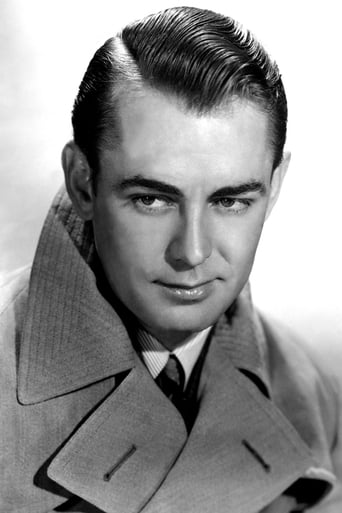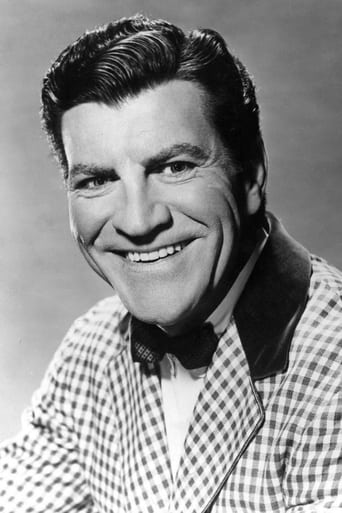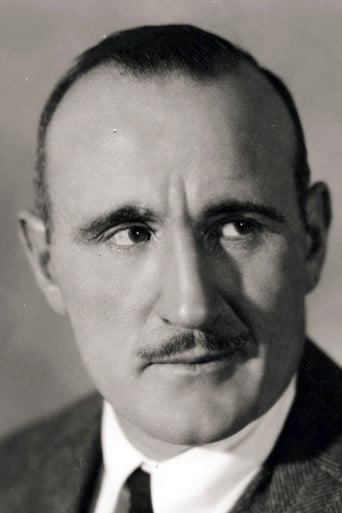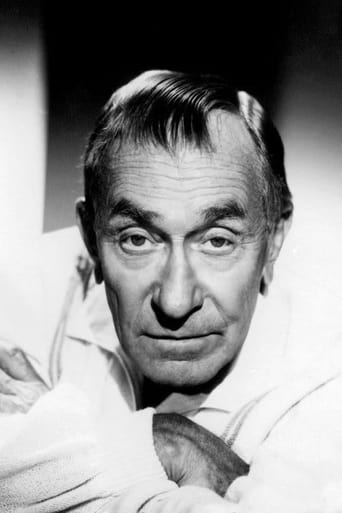weezeralfalfa
I must admit, I've only seen a couple of Alan Ladd films, not even "Shane". Here, his character's personality is that of a very private person, who mostly only speaks when he thinks he has something important to say. He appears to be very low key, but behind that languid stony face with penetrating soulful eyes, he's as tenacious as a bull dog about things he thinks are important, as his long time friend Murray Sinclair(Robert Preston) finds out after Smith(Ladd) discovers his criminal activities relating to the railroad he has long worked for, as has Smith, as a detective.Beefy Robert Preston was often cast by Hollywood as a flawed or unlucky character, often a friend of the lead male or female, who is talked into joining a crooked operation. Another classic example of this is seen in the railroad-dominated de Mille epic : "Union Pacific". Other examples include "Reap the Wild Wind" and "The Last Frontier". Usually, as in the present film, he's marked for eventual death. For a rare role where he is the hero, see the oil epic "Tulsa".It soon becomes clear that Murray married Smith's one time girlfriend(Marian), who still pines for Smith: still unmarried. Smith seems uncomfortable in expressing affectionate emotions, except with his eyes, and prefers a life where he travels around a lot, often in danger of being killed. Murray's breezy garrulous extrovert personality is so different from Smith's, its hard to believe Marian would feel comfortable with both. Apparently, she doesn't really. She's constantly expressing concern about Smith's safety and health, which eventually become wearing on Murray, who becomes jealous of Smith. But that's not the only reason Murray's friendship with Smith becomes unraveled during the course of the film. Smith gradually discovers his increasing involvement in staging train wrecks, then claiming that much of the perfectly undamaged freight is damaged, which is pilfered, often carried to the ranch of his neighbor Barney Rebstock(well played by familiar character actor Donald Crisp). After Murray's new superintendent(the no nonsense McCloud) finds out about his misclassification of freight, he's fired, which just makes him form a closer tie with Barney, with more frequent suspicious train wrecks occurring. Presumably, Murray is now leading the staging of these wrecks, Smith having killed the 3 Barton brothers, who presumably previously staged the wrecks. Smith tries to talk him into moving elsewhere and starting over with a new legitimate life. But Murray gets mad and decks Smith, who them turns to Marian to try to talk Murray into pulling up stakes. Surprisingly, Murray agrees, but is already committed to lead one last train wreck heist. Unfortunately, the law is alerted to this one. He gets shot in the arm and is slowly bleeding to death as he heads for home. Smith and sidekick Bill(William Demarest)follow him plus 2 companions. The companions are shot dead, and Smith has a chance to shoot Murray, but declines. The 2 arrive at Murray's after Murray, but Marian tells them she hasn't seen Murray, after giving them some incriminating info. But Smith detects the lie in her body language, as well as the blood spots on the porch, and doubles back after seemingly leaving. There follows a strange confrontation with Murray: partly antagonistic and partly conciliatory. Murray is now very weak, slouched in a chair. He has an opportunity to shoot Smith in the back, but finally declines it as he collapses onto the floor, thus reciprocating Smith's previous restrain(which he doesn't know about).We may wonder why Smith repeatedly bends over backwards to try to give the uncooperative Murray opportunities to rehabilitate himself. We must assume that either their friendship extends to the very distant past, or perhaps Murray once saved his life, or perhaps he has(or had) a homoerotic relationship with the man(Of course, with the film codes of the time, this possibility wouldn't be made obvious). Even as Murray expires, having just nearly decided to shoot him, Smith squeezes his hand, as an expression of lingering affection. Very unusual!The film begins with Smith leisurely riding his horse through the snow of the low slopes of the Sierras(presumably), then being shot at from a distance, wrongly being assumed dead as a result. We have to assume these men knew he was trailing them, otherwise this makes no sense.(They were the 3 Barton train robbers). Smith's horse was badly wounded, hence useless for him to ride. Thus, he walks toward civilization, which appears as a rail line. He builds a big bonfire as a signal for a train to stop, despite the fact that there is a driving rain that should have extinguished such a fire! Brenda Marshall(Marian) repeatedly looks longingly deep into Smith's eyes, suggesting a deeper affection than usual for the leading lady. Although not stated, I suspect that the other, older, occasionally featured woman: Emmy, also red-haired, is Marian's mother. This would also explain why her husband Bill is a frequent sidekick of both Murray and, especially, Smith. Among the pantheon of villains, none is more chilling than the heavy- lidded, mostly silent, Whitey(Frank Faylon): Barney's right hand man and executioner. Eventually, Barney becomes his victim, when Whitey decides to take his cash from the last train holdup. A little later, Whitey becomes a victim of Smith's pursuit of the thieves.Currently available in a DVD package of 4 '50s westerns, with different leading men.
zardoz-13
Director Leslie Fenton teamed up with his "Saigon" star Alan Ladd for the second time in this polished Paramount Pictures western "Whispering Smith" with Robert Preston. As the eponymous hero, Ladd is taciturn but swift on the draw. He is also extremely lucky, surviving two attempts on his life. The first time that our protagonist takes a bullet, he is fortunate enough to have a harmonica deflect the slug. The second time in a railway depot, he ducks a bullet and retrieves his hat to find a bullet hole in the crown. Ladd plays a pistol-packing detective for the Nebraska & Pacific sent to investigate number of railroad derailments and the subsequent loss of merchandise. Smith's old friend, Murray Sinclair (Robert Preston of "The Music Man"), is employed by the railroad, but he falls out of favor when the new head of operations arrives. As it turns out, Murray is in cahoots with an evil rancher, Barney Rebstock (Donald Crisp), who is your vintage villain. Before everything is over, Smith and Sinclair have a showdown with predicable results. The gorgeous Technicolor cinematography, sturdy acting, and some well staged shoot-outs bolsters this yarn. Preston makes an invigorating villain. There is one interesting scene when two men in a buckboard drawn by horses leave a pasture road, pass a large tree, and roll into a residence. What makes this cool is that stand-ins were used as the wagon leaves the field and travels past a tree. Once the two have passed the tree, it is clear that a skillful edit was effected. The sets are great to look at, too. Brenda Marshall is the woman caught in the middle between her old flame Smith and her husband Murray. Inevitably, Murray and Smith wind up squaring off against each other with an interesting conclusion.





